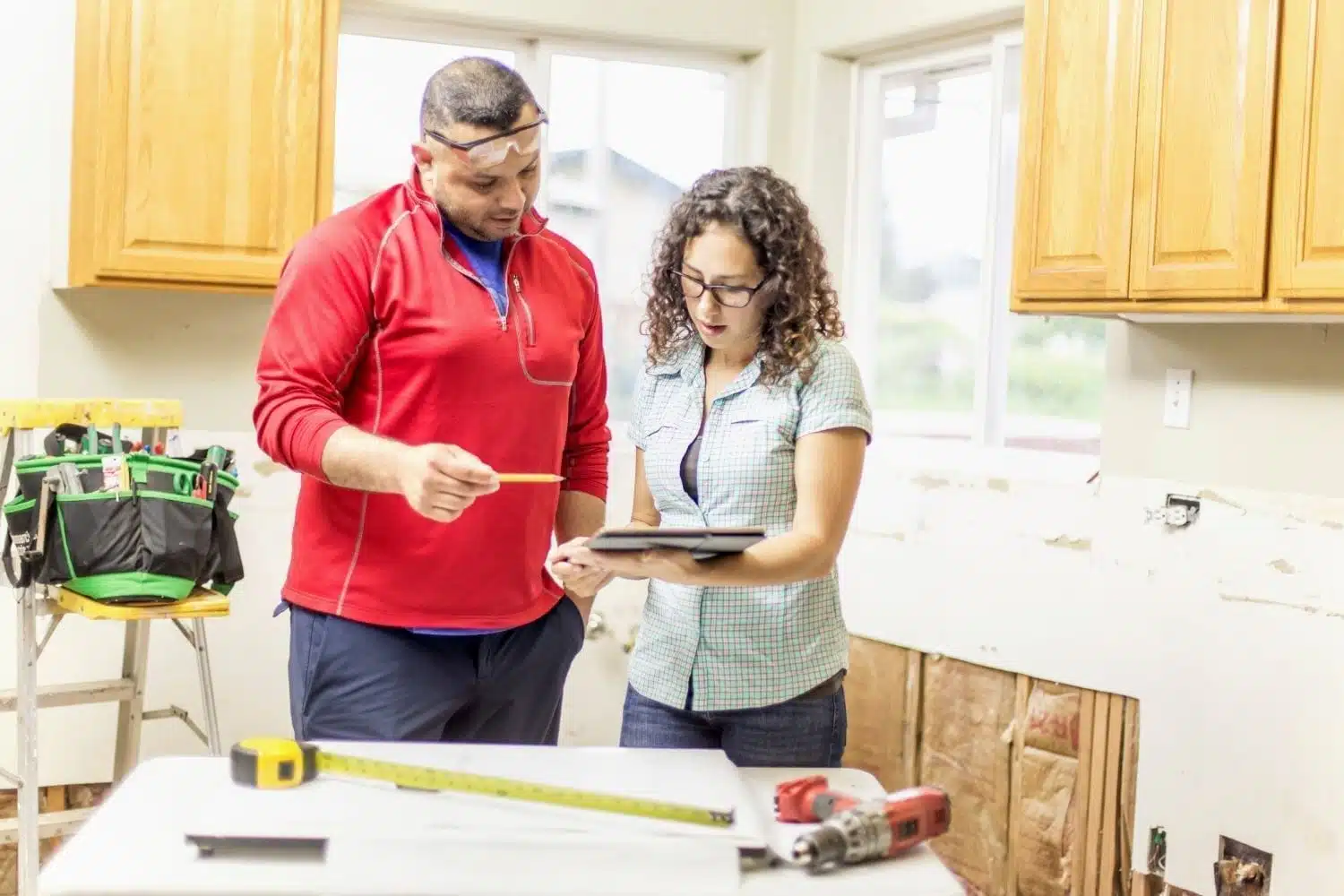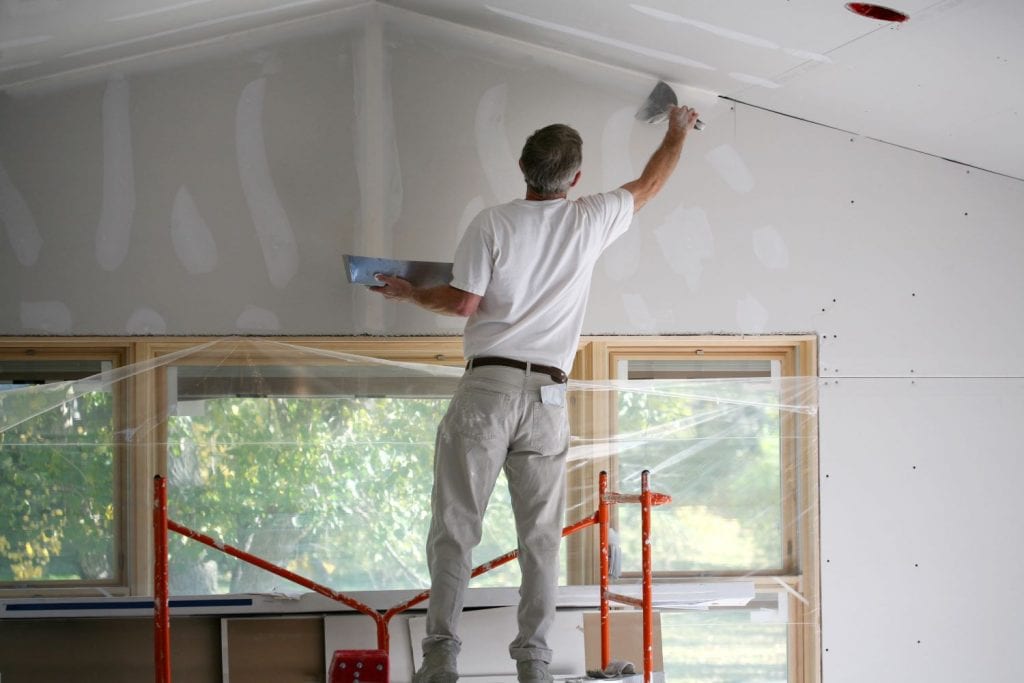How To Hire a Home Remodeling Contractor and What To Ask
Remodeling and Renovation Tips

Choosing home remodeling contractors is akin to deciding on doctors. It may not be your body, but having a specialist cut open and rearrange your home is not unlike having surgery. Whether you plan to stay in your home for many years or you’re remodeling for a quick sale, you want to make sure your specialist is qualified to do the job. So how do you know who to call for home renovation work? Read on!
For a home remodeling project, you should only be considering home remodeling contractors or home renovation contractors.
“There’s a big difference between someone who does new construction and someone who does remodeling,” says Jay Gauldin, president of TBS Construction in the Roanoke Valley of Virginia. “A remodeling contractor is used to dealing with occupied facilities.”
For instance, they’ll remember to block doorways to protect the rest of the house from dust, protect your flooring from the constant flow of traffic, and respect your privacy and your space. Less experienced home remodeling contractors may not know to manage those kinds of considerations.
|
Looking for home remodeling inspiration? Check out these articles on the PODS Blog: |
Are Home Remodeling Contractors the Best Bet for My Projects?
Making a decision about hiring a contractor for home renovation starts with the size of the project. If your home renovation project is a small one, you may wonder whether you need a contractor at all or if a handyman can do the job. The first step is to consider the entire project — your vision, expectations, and budget — and then pick the right person.
A licensed general contractor has the training and skills to assume the responsibility of any job, large or small. Their oversight and project management experience will ensure your job is done to code, safely, and within budget and deadline.
Home remodeling contractors are general contractors who specialize in remodeling rather than new construction. A handyman is a person skilled to do small jobs that don’t involve special licensing. Homeowners generally choose handymen for projects like hanging doors and windows, installing cabinetry, or laying flooring — not necessarily for major projects like renovating an entire living room.
If you choose to work with a handyman, verify that their license covers the type of work you’re asking them to do. Anything outside of their specified licensure is against the law and leaves you liable for any injuries, should they occur. For anything that involves electricity, plumbing, or project management, you’re better off hiring home remodeling contractors who bring the right licensure, insurance, and other requirements.

Need a new roof over your head? Be sure to hire a contractor with the right licenses, experience, and prices that work for you.
What Are the 4 Types of Remodeling?
Understanding the true purpose of a remodel can help you make the right decisions when it comes to your budget, your materials, and ultimately the home remodeling contractors you choose for every project. Once you’ve decided which category your project falls into, you can more realistically proceed with the other parts of the process. Generally speaking, there are four types of remodels:
1. The Basics
“The Basics” includes projects that you need to complete in order to live comfortably in your home. For example, replacing your 20-year-old roof with one that doesn’t leak would fall under “The Basics.”
2. Best Bang for the Buck
Remodeling projects that increase ROI (return on investment) are the ones that give you the “best bang for your buck.”. Let’s say you’re considering selling your home in the not-too-distant future, so you update your windows with more secure options, renovate your kitchen with more contemporary appliances and fixtures, or redo the outdated flooring in your home.
| Q: How much should you spend on home renovations? A: In 2025, anyone considering a budget for home renovations should factor in a big bucket of flexibility, as ever-changing tariffs are likely to fluctuate costs of materials from foreign markets. In general, though, home remodeling contractors and experts say $15 to $150 per square foot is a reasonable ballpark range — depending on the complexity of your project, the quality of your supplies, and how much ROI you’re looking to generate from the renovation. |
3. Curb Appeal
To increase the curb appeal of your home, you’ll want to focus on the exterior. For instance, you could hire an outdoor living renovator to refresh your landscaping, find a house painter to completely redo the look of your home and its trim, or replace your garage door (a new garage door also offers great ROI). For more involved projects, of course, you’ll want to interview home remodeling contractors or house renovation contractors to find the right fit.
4. Passion Projects
“Passion projects” include any remodeling done for fun because you just want to! Perhaps you decide to splurge on a new swimming pool or tennis courts, or to replace your master bath’s shower with a sauna!
How Do I Find the Best Home Remodeling Contractors Near Me?
The first place to start your search for a home renovation contractor is within your own circle of friends. If a girlfriend recently had her outdoor living space remodeled, ask her who did the job. “Most of our leads come from referrals,” says Gauldin.
If your friends don’t have anyone to recommend, try searching on sites like HomeAdvisor or the National Association of the Remodeling Industry (NARI). Once you start finding names of home remodeling contractors, take a look at their websites and make sure they’re experienced in the work you want. For instance, don’t hire an interior remodeling contractor if you’re looking to redo your roof. Read testimonials and reviews on Google or social media pages. Look at their portfolios for jobs similar to yours. And check the state licensing page online to make sure they’re licensed and haven’t had any claims brought against them.

A reputable home remodeling contractor will be happy to answer your questions and make sure you’re comfortable with their approach.
14 Questions To Ask a Home Remodeling Contractor
Once you narrow your search to a few possible candidates, it’s time to personally interview each one. The key to a stress-free (or at least not completely chaotic) project is to ask the right questions of your candidates. Here are 14 questions to help you make sure your contractor understands your vision, can get the job done on time and on budget, and has the necessary qualifications:
1. Are You Licensed and Certified?
If you’re wondering how to check a house renovation contractor’s license, it’s best to start with your state’s licensing page online. Gauldin says you can look up specific home remodeling contractors on your state’s page to see what licenses or certifications they hold. Also, find out what your county government requires. You want to make sure your contractor and their subcontractors hold the certifications related to the job they’ll be doing. If they don’t, you run the risk that they don’t have the proper training for the job.
Ask what special certifications the contractor holds, such as CGR (Certified Graduate Remodeler) through the National Association of Home Builders or LEED (Leadership in Energy and Environmental Design) through the U.S. Green Building Council, and if they belong to any industry organizations. “Membership in organizations and advanced certification shows they’re invested in their profession,” says Gauldin.
2. Do You Carry Workers’ Compensation and Liability Insurance?
If the contractor doesn’t carry the proper insurance, you’re liable if anyone is injured on site. Ask to see a copy of your home remodeling contractor’s insurance certificates. In some areas, according to Gauldin, small companies aren’t required to carry workers’ compensation. But if one of their employees is injured on the job, you’d be liable. This is something to cover with a handyman, too, as they tend to work alone or with just one other employee.
3. Will You Take Care of Building Permits?
This is a trick question. “Whenever a contractor tells the homeowner they need to get the permit in their name, red flags and alarms should go off,” says Gauldin. Because, ultimately, the person responsible for making sure the job is done properly is the person whose name is on the permit. A responsible home renovation contractor will understand this and act accordingly.
4. How Many Jobs Like This Have You Done?
If your job involves something like moving plumbing lines or knocking down a load-bearing wall, you want someone who knows what to expect. Even a seemingly straightforward bathroom remodeling job could pose a challenge for the house renovation contractor who’s never remodeled a bathroom before.
| Q: What’s the difference between renovation and remodeling? A: Many people use these terms interchangeably, but there is a distinct difference between the two. Renovation typically means a fix-up or refresh of an existing room, like repainting your bedroom or redoing hardwood floors. Remodeling goes a step further to change the structure or layout of the space, and generally involves bigger tools and heavier machinery. Knowing the distinction can help you find the home remodeling contractors — or renovation specialists — that are right for your projects. |

Many contractors hire subcontractors for home improvement work, particularly to help manage complex projects.
5. Will There Be a Dedicated Team on This Project, and Will It Include Sub-Contractors?
This question lets you know if the same people will come to your house every day or if you’ll have a steady flow of new faces. If you want to feel secure with strangers in your home, hire a contractor who provides a dedicated team to your job, and find out who the project manager is over that team. That team could include your home remodeling contractor’s own employees or subcontractors they know and trust.
6. How Do You Prefer To Communicate and How Frequently?
For a large remodeling job, weekly meetings with the project manager are ideal. But between those times, find out the best method of communicating with your home remodeling contractors and their team members.
7. What Are Your Payment Terms?
Gauldin says that Virginia requires home remodeling contractors to provide a line-item contract, spelling out each aspect of the job. Find out what’s required in your area, and make sure you have all the terms in writing.
|
Q: How do you ask a contractor for a quote? DIY home remodeling is an option, of course. But when you factor in the sometimes cumbersome permitting process, sourcing materials, and general risks — particularly involving electrical or plumbing work — you might find that home remodeling contractors are the more economical option in the long run. |
8. What Happens If Something Runs Over Budget?
Hopefully, you’re padding your estimate with 10–25 percent more for unexpected events. If your contractor finds mold behind the bathroom tile, which pushes you over budget, you want to know the procedure from that point forward.
9. How Are Change Orders Handled?
10. Do You Extend a Warranty on the Job?
Most contractors offer some form of warranty on their work. You want to know what it’ll cover and for how long. In addition, contractors should let you know if any materials or installations come with their own warranties. And if they do, make sure you get copies.
11. How Do We Resolve Any Conflicts?
Despite the best efforts of all involved in this remodeling project, conflicts may arise. If they do, you want to know the best way to resolve them. An experienced home renovation contractor already has a process in place for these circumstances.
12. How Long Should the Job Take? Can It Be Done in Time for the Holidays?
If you have a deadline in mind for this job, you want to make sure this house renovation contractor or remodeling contractor can meet it. Keep in mind, says Gauldin, that just the estimation process alone can take a few weeks.

Home remodeling contractors should be clear about how they’ll protect your belongings during construction.
13. What Steps Will You Take To Protect My House and Belongings?
First, you want to make sure your remodeling contractor carries adequate liability insurance for your job. But it’s nice to know they’re proactive in preventing damage in the first place. What else should you consider, though?
Ask where they’ll park their vehicles. You aren’t going to want a collection of work trucks on your lawn during the rainy season. Ask about sheeting to keep dust contained and coverings for your flooring. And what about your belongings? The last thing you want is a broken family heirloom because it fell off the shelf on the other side of the wall due to hammering. Many home remodeling contractors recommend putting personal belongings in storage during the construction phase. Ask how they suggest you clear the way for the work to be done.
| Pro Tip: Keep your home from becoming a “construction zone” with the help of a PODS portable storage container delivered right to your driveway. Store furniture and appliances safely out of the way during your project, or use the container as a staging area to keep remodeling supplies together and organized. |
14. What Does a Typical Workday Look Like?
If you work evenings and sleep until 10 a.m., you probably won’t want the buzz of saws from your kitchen remodeling contractor waking you at 7 in the morning.
The interview is also a good time to get a few things nailed down, like these five questions home remodeling contractors are accustomed to answering:
- How will you make sure my pets stay safe?
- Where will your team park?
- Do you need access to our bathroom, or will you bring a portable one?
- How are you planning to manage dust and debris?
- Where are you going to store your tools and materials when you’re not here?
So, are you ready to interview home remodeling contractors and find the ideal one to perform major surgery on your home? It doesn’t have to be a hair-pulling, migraine-inducing nightmare. Follow the points in our Ultimate Home Remodeling Checklist to make the experience a happy one.
Carol J. Alexander writes about home remodeling and lifestyle topics from her home in the Shenandoah Valley of Virginia. Her work has appeared in This Old House, Family Handyman, and Farmer’s Almanac.

Your quote in 60 seconds
Get pricing tailored to your needs!








